One of the most common questions regarding VPN usage is: Can a VPN increase Internet speed? Yes, it can, but most of the time, it won’t. I am going to explain when, why, and how it is possible.
By construction, a VPN uses encryption to secure the data transfer, and the encryption/decryption process takes time. Thus, a VPN is, theoretically speaking, slowing down the Internet connection. However, other factors may compensate for the speed loss and provide excellent overall performance.
We have performed a series of tests that show that a VPN may sometimes increase Internet speed. Let’s see the results first, and then we will find an explanation.
Factors that affects internet speed
To get access to the Internet, you need to either sign a contract with an Internet Service Provider (ISP) or connect to a device that is already connected to the Internet (e.g., a free WiFi network available at the airport).
It is important to understand that when you subscribe to a cell phone plan and access the Internet on your phone or tablet, the mobile carrier also acts as an Internet Service Provider.
In both cases, the download and upload speed of your Internet connection is conditioned by the connection provider (ISP, the network administrator), but it also depends on your device capabilities.
Several factors are explained below, and they may help you better understand how the speed of your Internet connection may be affected:
- Your Internet plan: The connection to the Internet is basically a service that may be offered in various flavors, and it depends on the size of your subscription. For example, you may get up to 100Mbps for the lite plan or up to 1000Mbps for the more expensive plan. The good news is that you may switch to the higher speed plan anytime.
- Connection type: Also related to your ISP is the type of hardware connection (fiber, cable, wireless, satellite). There are significant differences between these technologies, and that means different speeds.
- Network configuration: Most Internet users prefer connecting to their router with WiFi. For some devices such as mobile phones or tablets, it is the only option. However, using a LAN cable may result in much faster Internet speed.
- Network congestion/Number of users: Everyone is online these days, and if the ISP or the network connecting to the Internet are not prepared to handle all the exchanged data, you may experience reduced speed during peak hours. For example, in the evening, many people are watching Netflix, or at the airport when many travelers connect to free WiFi networks.
- WiFi issues: Your WiFi router may slow down your Internet connection. Make sure the router is placed as close as possible to your devices or use a wireless repeater. Some devices (microwaves, Bluetooth devices) or neighbor routers may interfere with your WiFi and result in slower speeds.
- Apps running on your device: Do you have lots of apps running on your device? There are chances that they may decrease the performance of your Internet connection. Some of the apps may run in the background, download, or upload files. Check file-sharing apps, auto-update settings, sync, or backup options.
- Viruses/malware: It is always a good idea to have an antivirus program installed on your device. Viruses, malware, and similar apps may use your Internet bandwidth and drain your computer’s resources.
- Bandwidth throttling: ISPs may intentionally slow down your Internet connection to regulate network traffic or reduce bandwidth congestion. For example, ISPs may block or reduce the speed of P2P or even Youtube traffic. In this case, a VPN for torrenting, connection to an obfuscated server, or a Youtube VPN may be the solution for bypassing the restrictions and get higher speeds.
- Government surveillance and censorship: If you are located in China or Iran, you may experience slow connections due to Internet censorship. Accessed content is filtered and monitored, resulting in lower download speed.
Does a VPN slow down your Internet connection?
A Virtual Private Network (VPN) acts as an intermediate between a device (computer, mobile phone, tablet) and the Internet. When the VPN is turned on, the data sent to the Internet is first transferred to the VPN server using an encrypted connection.
Once the data reaches the VPN server, the data is decrypted, and it is sent further to the Internet. The response received by the VPN server is then encrypted and sent back to the computer or device (VPN client) that required the data.
When a VPN is active the connection is slowed down due to two main reasons:
- Data does not travel directly to the destination. Instead, it is transferred to the VPN server and, after it is decrypted, it is forwarded to the destination.
- Encryption (and decryption) takes time. The higher the encryption (depending on the VPN protocol), the more time it takes to send and receive the data.
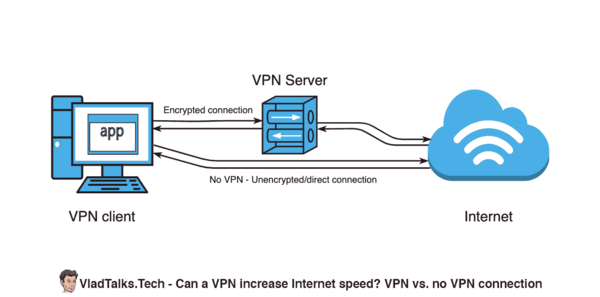
Thus, by connecting to a VPN, you should expect a decrease in your Internet connection speed. It is due to the functioning principle of a VPN.
Can a VPN increase Internet speed? Test results.
As explained above, VPN is theoretically slowing down your Internet connection. However, during a recent speed test study, we noticed that sometimes VPN might increase the Internet speed. Let’s take a look at the results first, and, afterward, explain how it is possible.
28.9% of the connections with VPN were faster than the connections without VPN
We have manually tested 100+ VPN connections with various VPN providers (NordVPN, Mullvad, PrivateInternetAccess, IVPN, and StrongVPN), various VPN locations, and VPN protocols (WireGuard, OpenVPN UDP, and OpenVPN TCP). The objective was to find out whether WireGuard was faster than OpenVPN. Still, we also observed that both OpenVPN and WireGuard were, sometimes, faster than the baseline, the speed of the Internet connection without VPN (check the testing methodology and observations for more details).
For about 29% of the download tests, the Internet connection speed without VPN was slower than the one with a VPN, meaning that it was lower than one of the VPN protocols tested.
That is quite an important result! It may imply that in more than 1/4 cases, a VPN connection may provide better speed than the regular Internet connection.
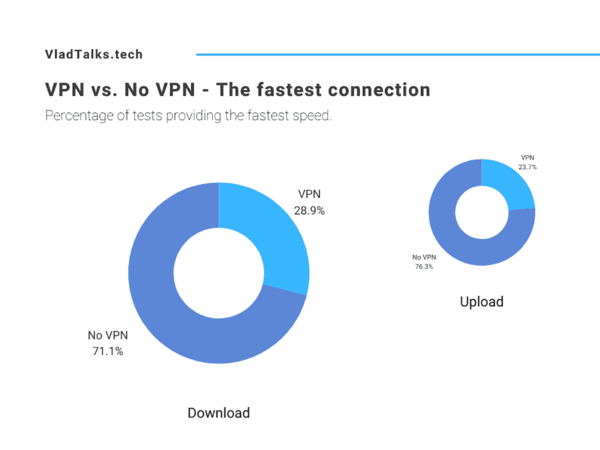
Additionally, we noticed that in about 7% of tests, all VPN protocols were faster than the no VPN connection. This may imply that somewhere along the line, some bandwidth throttling or filtering was in place.
43.4% speed gain for VPN connections
How much faster can a VPN connection be compared to the regular Internet connection? Surprisingly, the speed gain may be significant.
For example, for a connection to a test server located in Sydney (Australia), the regular speed was about 1Mbps without VPN and 33Mbps with a VPN. That was an extreme result, but important to show that it was possible.
On average, the VPN speed was 43.4% higher than the no VPN connection for the tests, for which it was a difference in favor of the VPN.
51% of the long-distance VPN connections were faster than the no VPN connections
During the tests, we also noticed that distance influences the speed of the connection. Not much of a surprise. However, for long-distance connections, about 50% of the VPN connections were faster than the baseline.
Firstly, we have grouped the connections on three categories:
- Short distance connections – for tests involving VPN servers located in Romania and neighboring countries (Hungary, Serbia, Bulgaria, Ukraine, Moldova).
- Medium-distance connections – for VPN connections in Europe.
- Long-distance connections – for VPN tests outside Europe.
The test results show that a VPN may get you a higher speed for long-distance connections than your regular Internet connection.
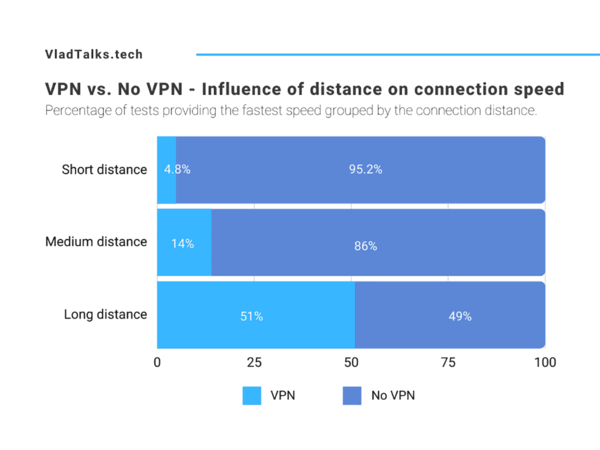
Why may a VPN increase Internet speed?
We have learned that sometimes a VPN may increase Internet speed. Let’s find out why.
The speed of a connection between two devices on the Internet is affected by how data is routed (travels) from one device to the other—the faster the route, the faster the connection speed.
In the case of VPN, data from the VPN client (the device connected to the network) may be routed to the VPN server faster than the regular traffic is routed on the no VPN connection. Sometimes, VPN providers can optimize data routing to provide even higher performance.
Additionally, a VPN may bypass various restrictions (bandwidth, filters) that block certain routes or intentionally slow down data traffic.
As seen above, a VPN can be very competitive on long-distance connections. The faster route compensates for the time taken by the encryption/decryption process and results in an excellent speed.
PingPlotter is a useful tool to see how data travels between your device and the destination. And, in this particular case, it can show how data is routed with or without a VPN.
For example, to access a server or website located in Australia without a VPN, your requests and data may be routed similarly to the table below.
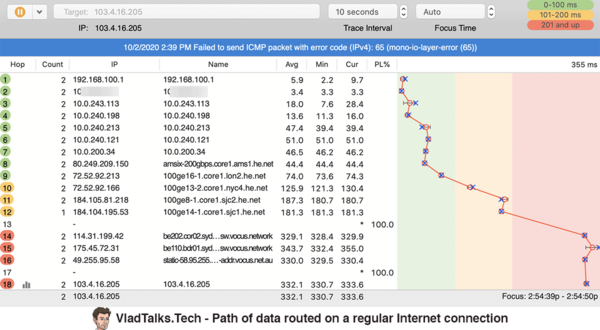
On the other hand, when the VPN is turned on and connected to an Australian server, the number of hops is lower, and there are chances that data travels faster.
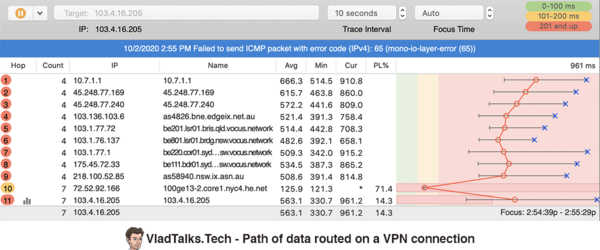
Conclusion
To sum up, our tests confirmed that it is possible to increase the speed of the Internet connection with a VPN. However, it is not guaranteed.
Additionally, we noticed that there are about 50% chances that a VPN to increase the performance of long-distance connections, and the speed gain may be significant.
Thus, you may consider using a VPN for accessing servers or online resources located far away from your location. For example, you may use a VPN for gaming which will turn out to be really valuable for a complete and complex online experience.
What do you think? Can a VPN increase Internet speed? Let us know in the comments below.
Would you like to be notified when we update this article? Subscribe to our newsletter below! You will make a Transylvanian baby-bat 🦇happy.

